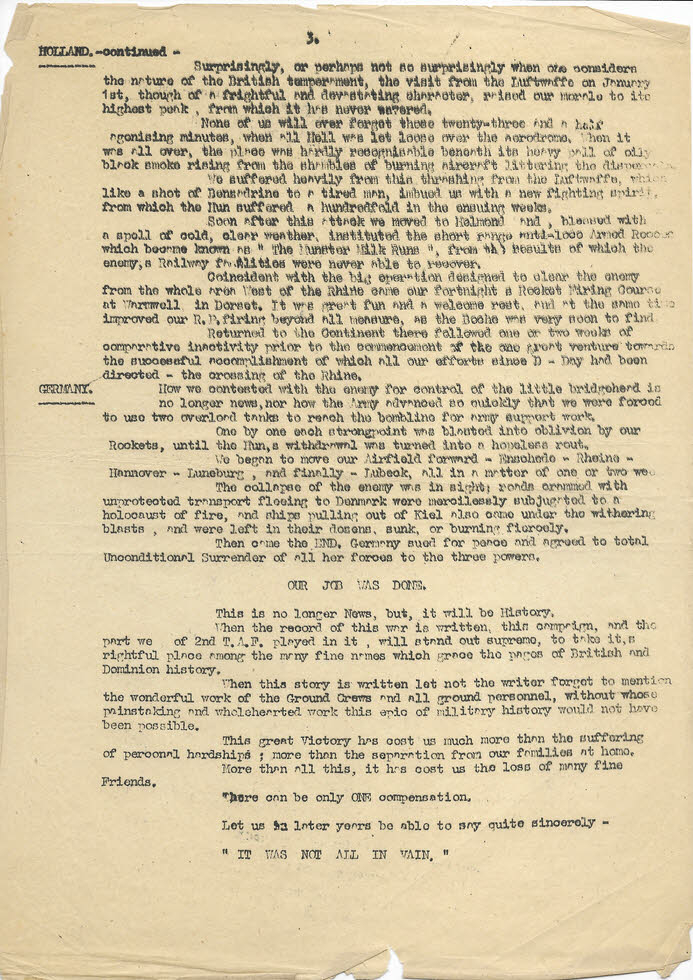
|
|

Many thanks to Jill Williams for sending us this news sheet, which came from the collection of her late uncle, Ernest Roy Pinson.
HOLLAND - continued
Surprisingly, or perhaps not so surprisingly when one considers the nature of the British temperament, the visit from the Luftwaffe on January 1st, though of a frightful and devastating character, raised our morale to its highest peak, from which it has never wavered.
None of is will ever forget those twenty-three and a half agonising minutes, when all Hell was let loose over the aerodrome. When it was all over, the place was hardly recognisable beneath its heavy pall of oily black smoke rising from the shambles of burning aircraft littering the dispersals.
We suffered heavily from this trashing from the Luftwaffe, which like a shot of Bennadrine to a tired man, imbued us with a new fighting spirit, from which the Hun suffered a hundredfold in the ensuing weeks.
Soon after this attack we moved to Helmond, and, blessed with a spell of cold, clear weather, instituted the short range anti-loco Armed Recces which became known as the 'Munster Milk Runs', from the results of which the enemy's Railway facilites were never able to recover.
Coincident with the big operation designed to clear the enemy from the whole area West of the Rhine came our fortnights Rocket Firing Course as Warmwell in Dorset. It was greta fun and a welcome rest, and at the same time improved our R.P. firing beyond all measure, as the Boche was very soon to find.
Returning to the Continent there followed one of two weeks of comparative inactivity prior to the commencement of the one great venture towards the successful accomplishment of which all our efforts since D-Day had been directed - the crossing of the Rhine.
GERMANY
How we contested with the enemy for control of the little bridgehead is no longer news, nor how the Army avanced so quickly that we were forced to use two overload tanks to reach the bombline for army support work.
One by one each strongpoint was blasted into oblivion by our Rockets, until the Hun's withdrawal was turned into a hopeless rout.
We began to move our Airfield forward - Ensehede - Rheine - Hannover - Luneburg, and finally, - Lubeck, all in a matter of one or two weeks.
The collapse of the enemy was in sight; roads crammed with unprotected transport fleeing to Denmark were mercilessly subjected to a holocaust of fire, and ships pulling out of Kiel also came under the withering blasts, and were left in their dozens, sunk, or burning fiercely.
The came the END, Germany sued for peace and agreed to total Unconditional Surrender of all her forces to the three powers.
OUR JOB WAS DONE
This is no longer news, butit will be history.
When the record of this war is written, this campaign, and the part we of 2nd T.A.F. played in it, will stand out supreme, to tke it's rightful place amongst the many fine names which grace the pages of British and Dominion history.
When this story is written let not the writer forget to mention the wonderful work of the Ground Crews and all ground personnel, without whose painstaking and wholehearted work this epic of military history would not have been possible.
This great Victory has cost us much more than the suffering of personal hardships; more than the separation from our families at home.
More than all of this, it has cost us the loss of many fine Friends.
There can be only ONE compensation.
Let us in later years be able to say quite sincerely -
'IT WAS NOT ALL IN VAIN'